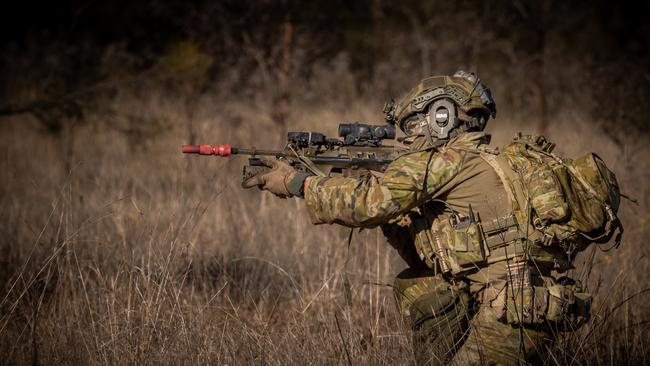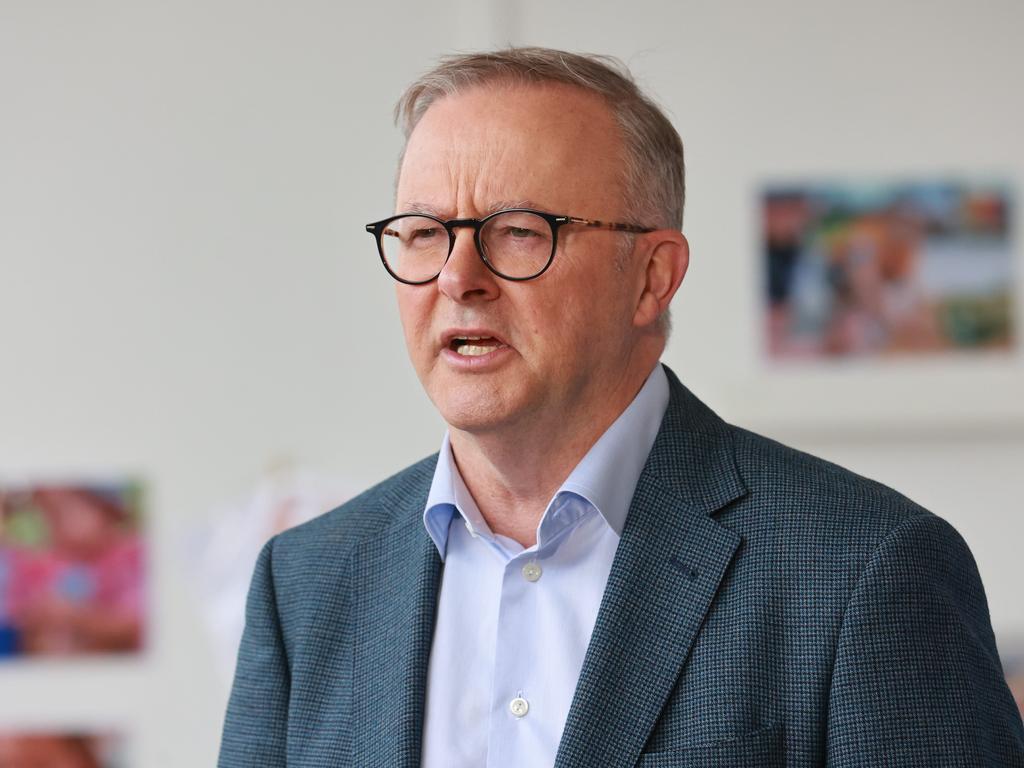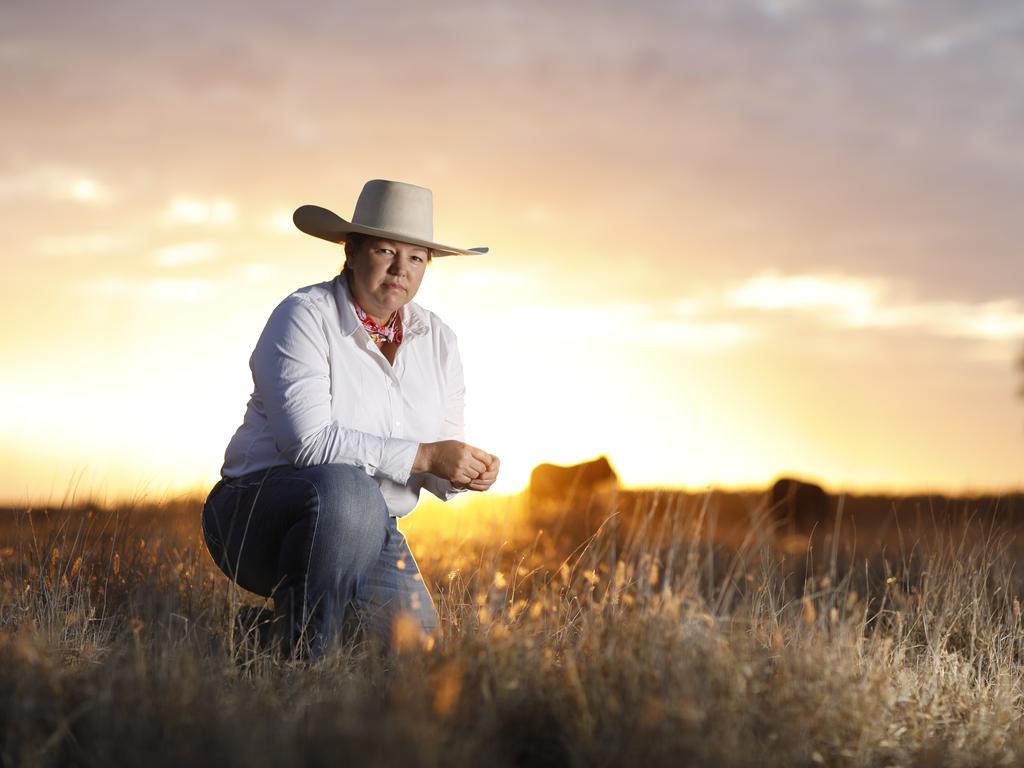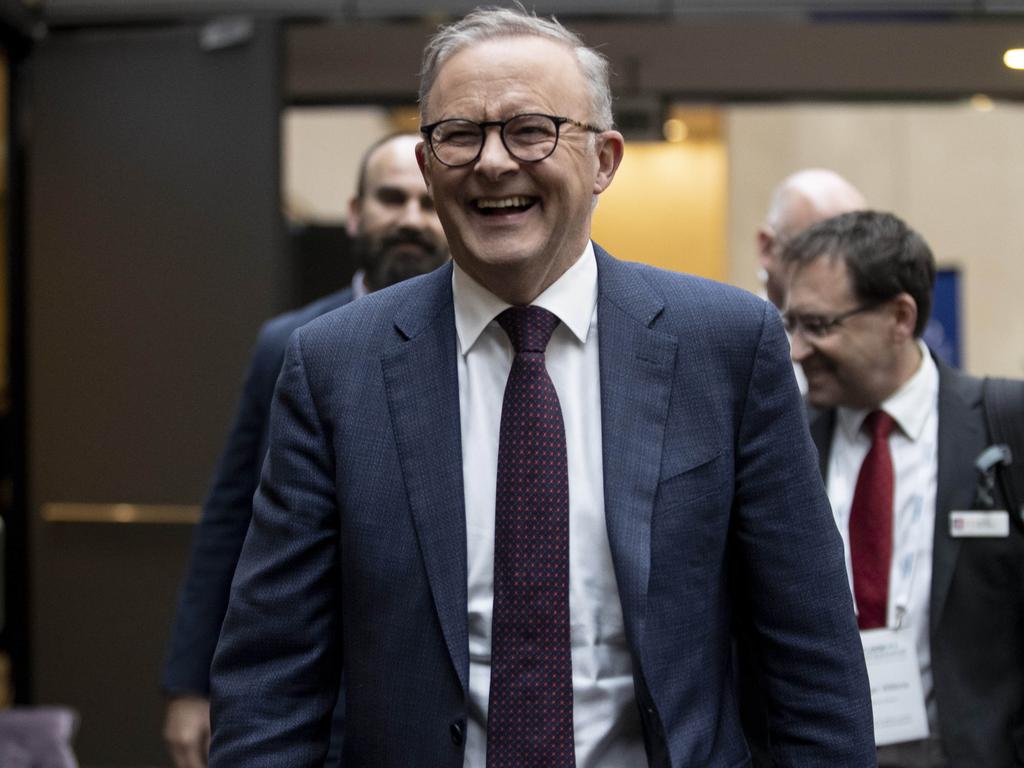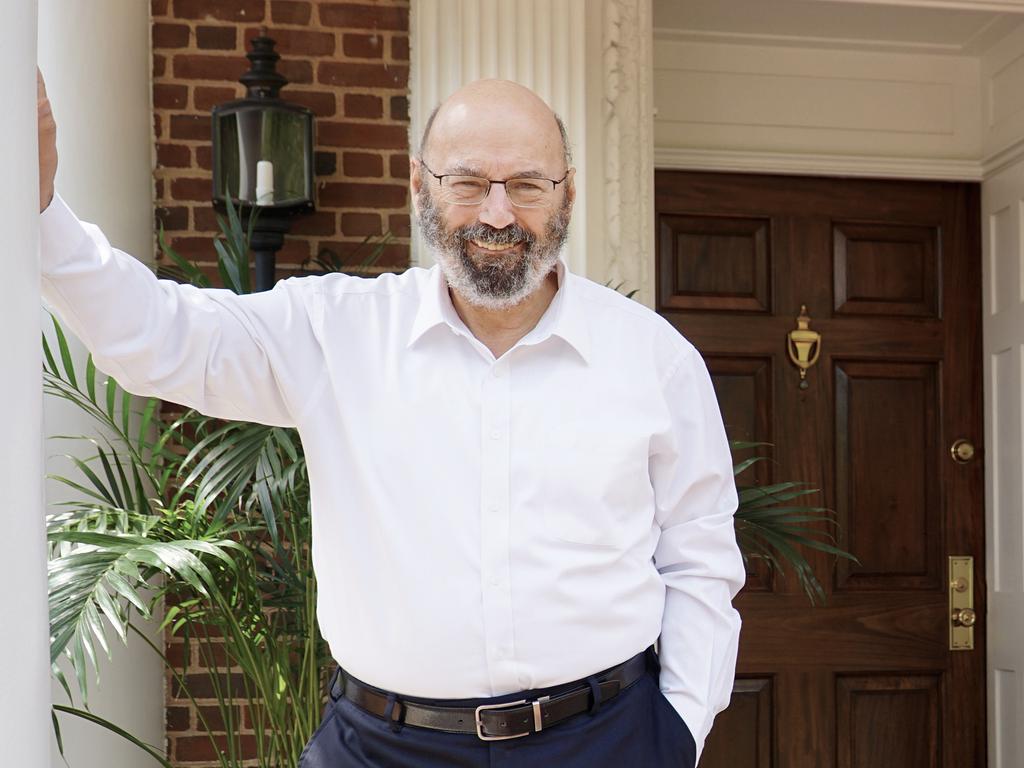Anthony Albanese may look and sound a mild man, and that is one of his strengths. But he has an ambition that no Australian leader has had for decades. He wants to create a military force capable of defending Australia.
To do this, he plans to change the structure of the Australian Defence Force and increase the defence budget. He is determined to do this – fully explicit in his commitment on money – even in the face of a budgetary tourniquet screwing ever tighter.
“Yes, yes! We will do what is necessary to achieve it,” he insists in an exclusive interview. “We’ve made that very clear. We’ve been really upfront, and we’ll do what is necessary. This is not optional, it’s necessary.”
He has a lot of other foreign policy ambitions as well: greater alliance intimacy with the US; a much closer mutual security relationship with Japan; developing the Quadrilateral Security Dialogue (he will host the Quad summit next year); deeper engagement with the South Pacific and Southeast Asia; a bigger aid budget; resisting Chinese coercion; and ambitious action on climate change.
It’s an enormous agenda for a prime minister and a government that once might have been expected to focus almost exclusively on domestic priorities.
Albanese was thrust into the role of international statesman in his first week as Prime Minister. The Quad summit was scheduled for two days after the federal election. Albanese and Foreign Minister Penny Wong flew to Tokyo the Monday after Saturday’s election. They took senior Defence and national security officials with them and had hours of briefings on the plane.
I met Albanese on Wednesday, just a day or two after former foreign minister Stephen Smith and former Defence Force chief Angus Houston handed to government the interim report of their force structure review. The final report arrives in February and the government will announce its response in March. Albanese, in the most substantial and wide-ranging foreign policy interview of his prime ministership, gives plenty of indication there will be big changes.
First, will we actually see increased Australian military capabilities over the next five years as a result of this process? “Yes, that’s the whole idea of the strategic review.” Before the election, Albanese announced a Labor government would undertake a force posture review: “We changed that to a defence strategic review, not just about where to place our assets but what are the (defence) assets Australia needs to defend ourselves, but also to project (force).”
Albanese mentions specifically missiles, missile defence capabilities and drones. This is explicit and clear. He also offers a compelling rationale for changing the force structure the ADF has had in the past.
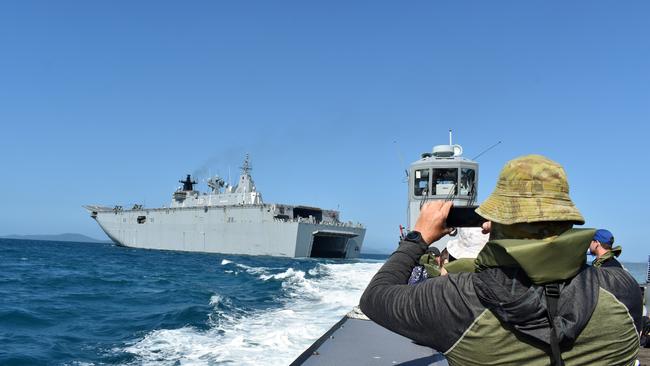
“In general we need more weaponry that can actually make a difference,” he says. “What are the assets we need so that every dollar improves our national security? Are we going to be involved in a land war, in central Queensland? If so, you need some assets for that. But is that likely? Well, no. A lot of the expenditure was based on where Australia’s recent military experience had been, in Iraq and Afghanistan. If you’re engaged in a ground war in Iraq and Afghanistan you need some assets there.
“But now the question is: how does Australia defend ourselves? Where are our missile capabilities? It means drones. It means different assets. In today’s world cyber security is very important. What are the right assets for this now? You need to be prepared to make these decisions.”
As well as the Smith-Houston review, the government has another study running to decide what kind of nuclear-propelled submarine we will acquire under the AUKUS arrangements with the US and Britain.
Albanese reveals that he and his cabinet have been intimately involved with both these processes on an ongoing basis: “The national security committee of cabinet meets almost weekly, sometimes more often. We have received reports (from the two reviews) on the way through. It’s not as if you go away and do an inquiry in isolation. We’ll get the report in the first quarter of next year and that will be very important.”
Albanese is critical of the way the Morrison government talked about the urgency of the strategic environment but made no plans for substantial new defence capabilities within the next decade. For a long time, Australia luxuriated under a strategic doctrine that there would be a 10-year warning of any strategic threat. The 2020 Defence Strategic Update formally acknowledged that the 10-year warning time no longer applied. Threats could emerge much more quickly.
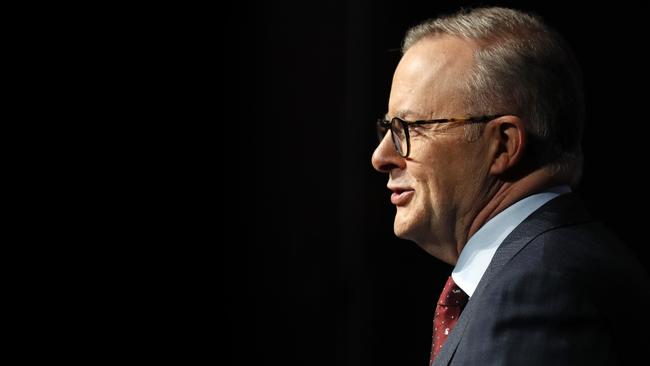
Albanese says: “The (threat) time frame changed from 10 years but there was no response to that. It was as if that was an anecdote, rather than something that needed to be responded to.” So we definitely get new capabilities in the next five years? “Correct. Correct.”
Albanese’s words will reverberate throughout the strategic community. It is difficult to see how the government could continue with $30bn of heavy armour for the army, as had been envisaged in previous government plans, in light of these remarks.
I spoke to Albanese on the day the media was reporting Chinese foreign ministry criticisms of plans for Australia to upgrade the Northern Territory’s RAAF Tindal base to accommodate six US B-52 strategic bombers rotating through Australia.
Is China right to protest this shocking Australian military build-up, I ask somewhat sarcastically. Albanese replies with his fundamental view of the US alliance: “We made our decision in 1941. That was the right decision then and the US is the right partnership now.” As to the B-52s: “Australia will make our own decisions. China is entitled of course to express a view.”
But Albanese is unimpressed with Beijing’s warnings or its behaviour in the region: “China clearly has changed its posture in the region and that’s something that, as a middle power in the region, we need to take account of. The strategic competition in the region informs our view of our relationships with nations in the region, and the way the region conducts itself.”
You can see this in the growing strategic intimacy Albanese has pursued with his Japanese counterpart, Fumio Kishida. In five months as Prime Minister, Albanese has met Kishida four times - at the Quad in Tokyo, at the NATO summit in Madrid, at the state funeral for Shinzo Abe in Tokyo, and in Kishida’s bilateral visit to Perth. Albanese reveals that at all four meetings, and in various telephone conversations, the two leaders spoke about the historic joint security declaration they later signed in Perth last month. “This was driven from the top, by the prime ministers in both countries,” he says.
It must surely be the most intense five-month personal leader-to-leader engagement in the history of the Japan-Australia relationship. The two will get together again for one or more bilateral meetings in the forthcoming trio of summits both will attend this month: the G20 in Indonesia, the East Asia Summit and the Asia-Pacific Economic Co-operation summit in Southeast Asia.
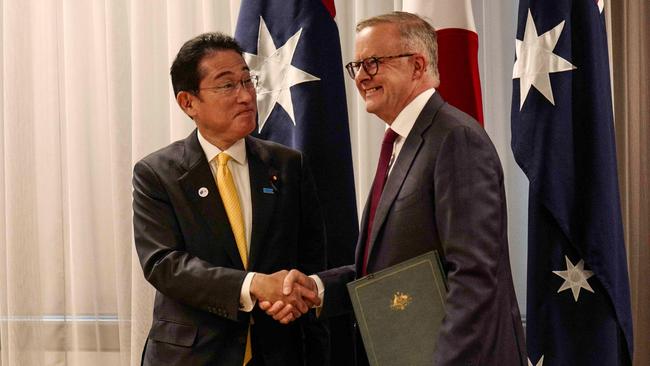
The security declaration with Japan intentionally used language very similar to that contained in the ANZUS Treaty Australia has with the US. Albanese is not surprised it was noticed: “I saw it as a significant upgrade of a (security) relationship that has been implicit to one that is explicit. It was the cementing of a friendship, a public declaration of that.”
Albanese and Kishida share the view that it’s impossible to imagine Beijing joining the Trans-Pacific Partnership trade agreement: “Our position is that in order to support accession to the TPP, countries would need to demonstrate their support for existing agreements. At the moment, China’s actions in placing sanctions against Australian products means that China is counting itself out.”
This does not mean that if Beijing lifted its sanctions against Australia Canberra would automatically support it joining the TPP: “There are a range of issues, but China is excluding itself. That (lifting sanctions) is a precondition.” But as Albanese says, even if and when Beijing lifts sanctions “there are a range of issues”.
The PM would like the US to reconsider joining the TPP: “Largely there the impediment to the US joining is domestic politics. I’d be hopeful they would consider a change in their position. Part of US engagement in the region is economic engagement and TPP membership would facilitate that.”
At the G20 summit Albanese believes there will be the chance for economic policy co-ordination among all the major economies. One controversy is over whether Russia’s Vladimir Putin will attend. Albanese declared very early that, regardless of Putin’s attendance, he was going to the G20: “This was an important signal early of the relationship we have with Indonesia and the respect we hold for them.
“The G20 meeting is particularly important for Indonesia. At a time of uncertainty and global unrest, with a land war in Europe, strategic competition in the Indo-Pacific and economic turbulence, this is a particularly important conference.”
The meeting will be an opportunity for leaders to sell the economic message of the times: “The fact of the gathering will be a reminder that you’re actually getting pretty uniform action from the central banks across the board, with uniform tightening of monetary policy the like of which we haven’t seen for decades.
“All the central banks are targeting inflation as the priority. I think what we saw in the UK (under Liz Truss) was the markets responding to measures that were seen as not consistent with the actions of the central bank.
“That was the context of our budget, too. We wanted to make sure that fiscal policy was working with monetary policy, that they were not contradicting each other.”
He believes the G20 will focus global attention on the fight against inflation and the possible cures of it, including increased productivity.
Asked whether Russia should be in the G20 at all, and whether Putin should be allowed to attend, Albanese responds: “Sometimes exclusion can make it easier for the excluded to hide behind that and not have to justify its actions. I think if Russia attends the G20 that is the opportunity the world will have to make very, very clear what they think about Russia’s actions.”
Albanese and his government could not have been stronger in solidarity with Ukraine and opposition to Russia’s invasion. Albanese visited Ukraine and his government has twice extended military aid packages to Kyiv.
Does he think there is a real danger of Moscow using some kind of tactical nuclear weapon, to the possibility of which Putin has alluded more than once: “I take Putin’s threats very seriously. It has reminded the world that the existence of nuclear weapons is a threat to global security and the norms we had come to take for granted.
“Putin threatening to use nuclear forces on Ukrainian forces or Ukrainian people – the consequences of that would be an absolute game changer in a very bad way.
“Post the Cold War there was a de-escalation. This is a significant escalation by someone who clearly miscalculated. There are a range of remarkable things that have happened.
“One is the courage and resilience of the Ukrainian people, under the leadership of President Zelensky – they have fought for their national sovereignty. Another is the strength of the world’s efforts to support Ukraine. Australia has been part of this in a bipartisan way. And the third is that NATO is now stronger than it was before the Russian invasion of Ukraine. Putin was confident he’d roll over Ukraine very quickly. That certainly hasn’t happened. Now the call-up of 300,000 troops is causing, must be causing, some instability inside Russia.”
Next year Albanese will host the Quad summit. Labor had a troubled history with the Quad. Under Kevin Rudd, it did not support the Quad. Former prime minister Paul Keating is a trenchant opponent of the grouping, which brings together the US, India, Japan and Australia.
Albanese is unapologetic that the Quad serves the strategic interests of Australia and of the region: “I think the Quad is of central importance, if you look at it geographically, strategically, historically.
“India will be the third largest economy in the world (it is currently fifth). It is very important strategically and in its role in technological advancement, in IT. We have a lot in common with India.” Albanese will travel to India early next year.
“And Japan has been such an important economic partner. Australia’s role in fuelling the post-war growth in Japan has been critical. And the US remains our most important ally. The Quad brings together these four countries in a trusting relationship. I regard it as an incredible honour for me as PM, and for Australia, to be hosting the Quad summit. The Quad is important now but it will grow in importance.”
Albanese is proud of his relationship with Joe Biden. Two centre-left political leaders at different stages in their lives but with not wildly dissimilar political pedigrees. His government shares with the Biden administration a view of the central importance of action to combat climate change: “The price of admission, the price of credibility, in the international system is having effective action on climate change.”
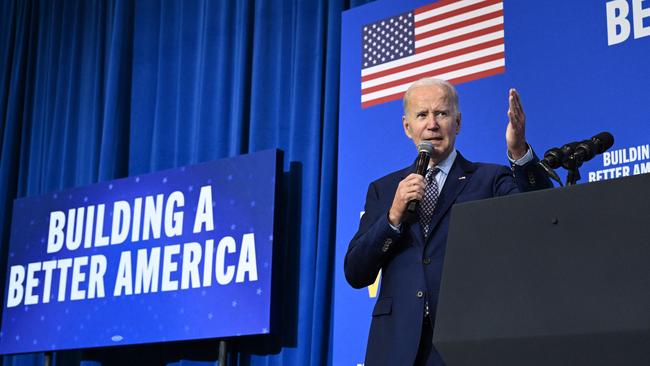
Yet this US attitude could be significantly set back, if not reversed, at next week’s midterm US congressional elections.
Could Albanese work with a re-elected Donald Trump, something that is not beyond the realms of possibility in 2024: “I think the relationship between Australia and the US is much more important than individuals. It’s a relationship between nations.”
That must count as a qualified yes, and of course any Australian prime minister would be willing to work with any American president. Albanese sees all the dimensions of foreign, security and most domestic policy as intimately linked. He favours action, for example, to bolster Australia’s fuel reserves and re-create a merchant navy: “We remain vulnerable at the end of global supply chains. The idea that our fuel reserves are held in the Gulf of Mexico and that we don’t have the capacity to take goods around our own coast, as an island continent, is a national security issue. The rest of the world regards having a merchant navy as essential. It is absolutely essential that Australia have a merchant fleet.”
In a national emergency the government can commandeer Australian-flagged vessels for essential work. But there are only a tiny handful of Australian-flagged commercial vessels.
Albanese’s government has been exceptionally busy in national security and foreign policy. His Foreign Minister, Wong, has been a blur of motion around the South Pacific and is now travelling extensively in Southeast Asia. Defence Minister Richard Marles is focused on the big force structure decisions. Albanese has driven our interests in intense head of government diplomacy.
He has used soft power where possible, not only increasing aid budgets but also welcoming South Pacific leaders to Australia, giving some of them a lift to Shinzo Abe’s funeral and the like.
He has a thousand challenges ahead at every angle. His first moment of truth comes next March when we will see what defence capabilities he can produce and in what time frame. Australia’s security environment is even more threatening than its economic outlook. Albanese has established a clear, effective direction, mostly embodying basic strategic continuity, with new energy and focus.
Australia will need him to have all that and more, and even a touch of luck. For he has promises to keep, and miles to go before he sleeps.

